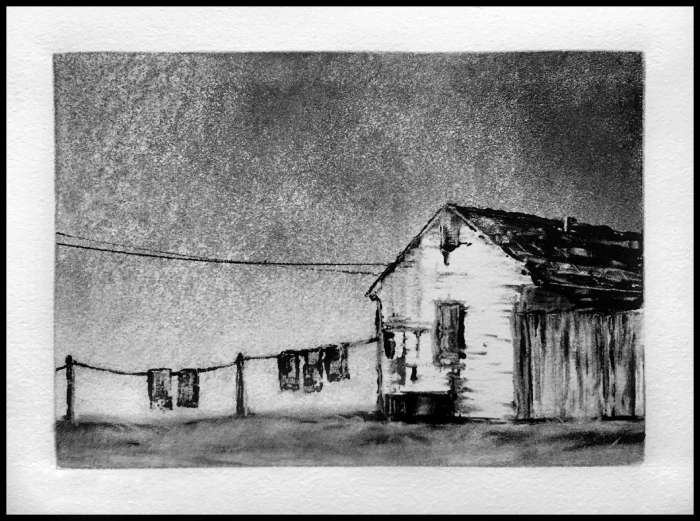Flash Nonfiction
by Margarita Beatriz Escobar

I approached the open casket and leaned over to kiss my grandfather’s forehead. He wore his old dark suit, a white shirt, and a small red carnation in the lapel, his favourite flower. He looked handsome and I adored him.
I’m sad I didn’t have the chance to say, Adios Tata. I got there too late. He was eighty-two years old when his heart suddenly stopped beating. As a widower, he lived by himself; solid and healthy. He still worked the land.
I remember my grandfather always saying, This is my land. He was referring to a property he inherited from his father. It was about two hectares of fertile terrain and a large adobe house. It had a small paddock where a couple of horses were kept. A pigpen housed a few pigs, a chicken coop, an orchard, and two dairy cows, Rosita and Campana.
It wasn’t a grand place, but it was his.
My siblings and I spent most of our holidays at my grandparents' house. For us city children, spending a couple of months in the countryside was paradise. We learned to milk the cows, ride the horses, sunbathe in the meadow, and swim in a nearby river.
My most precious childhood memories are intertwined with the countryside and my grandparents’ house. They worked hard to make a living, harvesting what they could and selling eggs, chickens, and pigs. They also sold homemade cheeses from the milk Rosita and Campana provided.
When I close my eyes, I picture my grandfather. I can see him smoking his old pipe, sitting in his tattered rocking chair, telling me stories about the early days when he helped his own father work the land.
His family emigrated from Spain in 1939. They arrived in Chile on the SS Winnipeg, a ship that carried over 2,000 people fleeing Francisco Franco's dictatorship. His parents and their young boy arrived in a new land with no more baggage than their hopes and fears. My grandfather didn’t remember much; he was four years old, but some memories stuck in the twists and turns of his brain. He recalled the sea, the menacing winds that scared him at night, and the refuge he found in his mother’s bosom.
Through decades of relentless work and hardships, my grandfather’s dad acquired a modest piece of land that my grandfather had inherited.
Because I was young, I didn’t grasp the deep meaning of his saying, This is my land. Later, I understood he was referring not just to a piece of terrain but the core of his existence.
My grandparents spent their lives maintaining this place, which brought them joy. Their hard work allowed them to make an honest living. After years in the country, they learned to adjust to the new place and ended up loving their new land.
Decades later, when horror assaulted my small country in the southern part of the world and another dictator grabbed power, we had to flee our land.
History repeated itself.
When my family emigrated north, to the other end of the planet, I thought of my grandfather and everything his family went through as immigrants.
The idea of land is intertwined with the perception of identity and the ability to adjust to change. Emigrating to a new country is an experience that marks people’s lives in many different ways, and it is also full of challenges: learning a language, adapting to a new country's idiosyncrasies, making a living doing menial jobs despite your education and sometimes putting up with discrimination.
Loneliness is something else. The idea of extended family doesn’t exist and people miss their loved ones. But life can be generous, and new friendships are developed.
After my grandfather’s funeral, I flew back home. My husband and I have lived most of our lives in this part of the world. We have raised a family, worked, retired, and learned to love this land. The afternoon I arrived, we sat on a bench in a nearby park and enjoyed the view of the magnificent mountains and the striking beauty of the rhododendrons guarded by a long line of maple trees. This is the land where our bones will rest.
As evening approached, the image of my grandfather came to my mind again. I felt like I could see him smoking his pipe, his eyes gazing at the horizon, saying: This is my land.
Appeared in Issue Fall '24
Nationality: Chilean-Canadian
First Language(s): Spanish
Second Language(s):
English
Stadt Graz Kultur

Listen to Margarita Beatriz Escobar reading "My Land".
To listen to the full length recording, support us with one coffee on Ko-fi and send us an e-mail indicating the title you'd like to unlock, or unlock all recordings with a subscription on Patreon!
Supported by:

